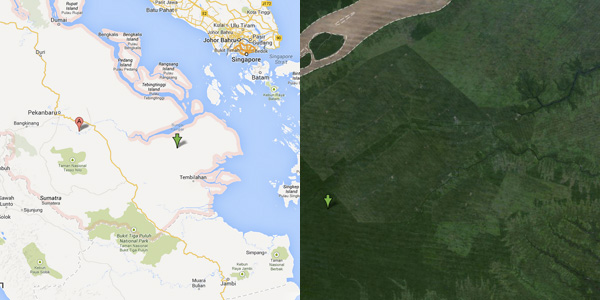In what may be an unprecedented move in the Indonesian forestry sector, Asia Pulp & Paper (APP) has announced two breaches of its moratorium on natural forest clearance.
In a report published Wednesday, APP said an audit of its operations by The Forest Trust, the NGO charged with implementing the forestry giant’s forest conservation policy, turned up two incidents of forest clearance that has taken place since the logging ban took effect in February 2013.
In one case, clearing was done on a small-scale under a pre-existing agreement with a local community. The context was the same as the incident reported by Eyes on the Forest, a coalition of Sumatran environmental groups, in May where 70 hectares were cleared by Riau Indo Agropalma (RIA) in Riau Province. That complaint spurred the audit.
A letter from APP explains:
This clearance took place because RIA had, two years previously, entered into an agreement with a local community to develop the area – an obligation of concession owners. The FCP Implementation Team incorrectly concluded that the area could be cleared.
As a result of this incident, TFT and APP carried out an audit of all concessions to determine whether there were any further cases like the one in RIA, where previous commitments with communities had been made.

Fate of deforested lands in Riau, 2007-2012. Data from Eyes on the Forest
The second case identified by the audit involved an outright policy breach in South Sumatra by three companies — PT. Bumi Andalas Permai (BAP), PT. Sebangun Bumi Andalas (SBA), and PT. Bumi Mekar Hijau (BMH) — that had cleared 69 hectares of high carbon stock forest in a “No Go” zone. APP called the violation “unacceptable”.
“This is an unacceptable breach of APP’s natural forest clearance moratorium and its FCP, and is the result of an inadequate sign off and company supervision process,” said APP’s letter.
As a result of the audit, APP says it has introduced new procedures for signing off on, supervising, and monitoring development within existing concessions.
“As a result of these cases, new procedures have now been introduced by APP/TFT to prevent any such issues from occurring again. Not only are we now addressing these issues, but we are also using the findings to improve the way we implement the FCP.”

Green arrow shows point where Riau Indo Agropalma’s moratorium breach occurred.
APP’s decision to establish its forest conservation policy was a momentous one for the beleaguered pulp and paper producer, which had lost dozens of customers due to concerns over its environmental record in Sumatra. Activist groups like Eyes on the Forest, Greenpeace, and the Rainforest Action Network, among others, ran aggressive campaigns blaming APP for destroying vast areas of wildlife-rich rainforests, exacerbating social conflict, and contributing substantial greenhouse gas emissions through peatlands conversion.
Today these groups have for the most part toned down their campaigns against APP to give the forestry giant time to implement its new policy, which explicitly prohibits sourcing of fiber from logging of natural forests and conversion of peatlands. The policy also includes provisions for Free, Prior Informed Consent in dealing with local communities. Finally APP has set up a complaint process for registering violations of its policy.
While the moves are the first for a major forestry company, Greenpeace and others are still taking a “wait-and-see” approach and cautioning buyers about sourcing from APP until it is clear it will stick with the policy.
For its part, APP says it “[remains] committed to our ‘zero deforestation’ policy and continue to implement it across our entire supply base.”
APP is one of Indonesia’s two largest pulp and paper producers. Its supplier concessions cover over 2.6 million hectares in Indonesia, according to the company.
Related articles







